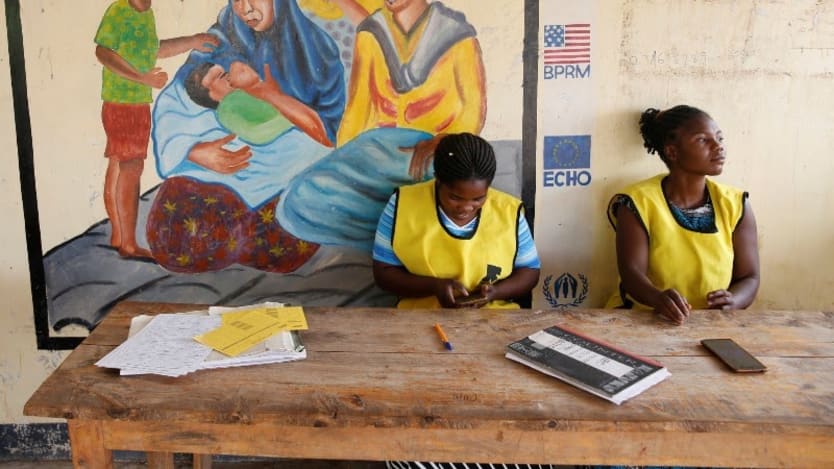
My career in global health began with overturning a racist assertion. When applying for my first job in the sector in 2006, I was told that the organization did not hire Black people at their headquarters. The statement came from a white refugee health academic at Columbia University, and unbeknownst to him, it wasn’t necessary to manage the expectations of an African immigrant who grew up in Texas.
After I eventually got the job, I felt he should have caveated the statement: They did hire a few Black people at headquarters — just in the mail room or as administrative assistants. I was, indeed, the only Black person based in the HQ technical advising unit of their overseas programs.
On inclusive development:
► Minorities less likely to get promoted in USAID civil service, watchdog finds
► Opinion: On equity in the international development sector — we need more intravists
► Women Deliver launches investigation following staffers' allegations of racism
Working in this organization provided the most formative experiences of my career, and I worked alongside people who became my lifelong friends. This was also against the backdrop of measurable improvements in representation of people of color in technical advising positions and, eventually, country director roles during my time there. But the organization did not progress further. After five years, I moved on to work with other development NGOs, global health academic institutions, and earn my doctorate overseas.
Experience of marginalization
Things have not changed as much as they should. Seven years later, in 2018, I returned to Washington, D.C., to work for another global health organization. I was, once again, the only Black person in the organization, until an intern came along six months later. However, this experience of being “the only” was different. It was insidious.
My experiences included being the only person with a “director” title without authority over my budget and staffing; participating in meetings where the work of minority and female academics were arbitrarily downplayed or criticized; and being shut down when raising the need to consider race and diversity in the context of vaccine hesitancy.
A formal complaint about my treatment led to a perfunctory meeting with senior leadership and human resources, during which my supervisor committed to actions for which he was not held accountable.
It also led to my being marginalized from a leadership role in a “high-level” meeting on the subject of my expertise; my bio and other attestations to my experience were left out of meeting materials.
I am still warning women of color who enter the sector about the systemic racism and the barriers they will face. But, if the flurry of anti-racism statements translate into actions and structural changes, I may no longer have to.
—When I left this organization after 10 months, no one asked why. Today, the organization touts a statement about George Floyd and anti-racism on their website as performative activism. However, they have no Black people in their senior leadership, no Black people on their board, and certainly no Black people among those they bestow awards for advancing global immunization.
And yet, Black people in the form of stock photos are displayed throughout their website, presumably representing the “beneficiaries'' of their programs. My lesson from this experience was that, clearly, no amount of credentials or experience in global health and international development could “inoculate” me from walking into racist organizational cultures.
Structural changes needed
These two organizations represent the better and worse extremes of my experiences within the walls of white-dominated headquarters of development organizations. It would be disingenuous of me to equivocate these experiences, or to say that I haven’t worked with white colleagues who were allies against systemic racism. On the contrary, it is precisely because I know what that looks and feels like that I can clearly say when it isn’t and doesn’t.
Neither organization was ideal. However, one organization improved and then plateaued in the absence of incentives to push further. The other organization has no desire for awareness, nor motivation to improve.
This distinction is important at a moment when both organizations have anti-racism statements on their websites. My recent experience with the worst of these organizations tells me that nothing short of structural changes at the level of senior leadership and organizational governance would be sufficient.
Priorities should be to:
• Dedicate resources to an independent entity outside of the organization to review employee hiring and retention patterns since the tenure of the current CEO, devise strategies and targets for improvement, and publicize the report on progress.
• Link diversity and equity targets to CEO and senior leadership compensation.
• Diversify the board and create a board subcommittee dedicated to diversity and inclusion.
• Publicize whether they have used non-disclosure agreements, to silence harassment and discrimination claims and commit to discontinuing such practices.
• Dedicate resources to an independent entity outside of the organization to review current harassment and discrimination policies, interview current and former staff on experiences, provide recommendations, and engage in routine monitoring.
• Make discussion of anti-racism, discrimination, and harassment a part of all programming and provide mechanism for reporting discrimination and abuse experiences in context of interaction with the organization.
Ultimately, public transparency and accountability are key to incentivizing organizations to advance. Thus, anti-racism statements of both organizations should be followed in the coming months with statements of the structural changes they undertook and the progress they have made.
Apply data-based decision-making to anti-racism efforts
Global health and development prioritize data and evidence-based decision-making. This approach must also be applied to anti-racism efforts.
There is a need to consider the development and application of sector-wide indicators: the social confidence index equivalent of Charity Navigator for global health and development organizations. The same level of external auditing and rigor for financial hygiene should be applied to anti-racism and other efforts at improving and maintaining equity.
Such an index could display information such as diversity of board members, diversity of senior leadership, pay scales, promotion statistics, and use of NDAs.
Ultimately, this evidence-based approach could extend to programmatic indicators of equity such as the percentage of funding that directly supports local organizations. This information would be useful in guiding decisions for potential employees, students, collaborators, and donors.
My career in global health began with a racist assertion. Sadly, that assertion was only lacking in its failure to capture the range and magnitude of a problem.
My experience is not unique and my call for action is not new. Fifteen years later, I am still warning women of color who enter the sector about the systemic racism and the barriers they will face. But, if the flurry of anti-racism statements translate into actions and structural changes, I may no longer have to.








